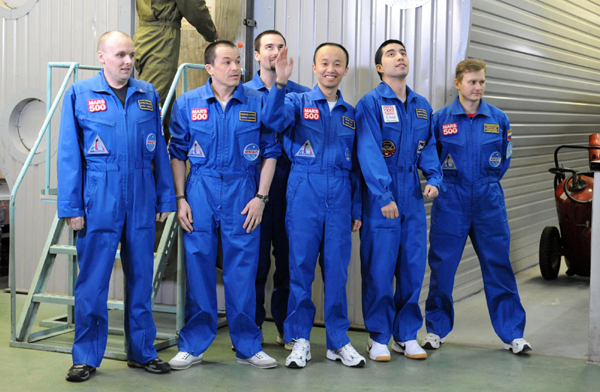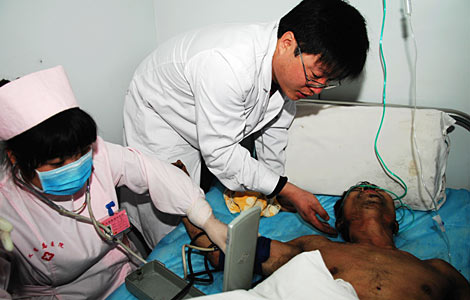Mars crew 'lands' after 520 days in isolation
Updated: 2011-11-04 20:23
(Agencies)
|
|||||||||||
 |
|
Wang Yue (R3) from China waves after he left the mock spaceship with other Mars500 experiment crew members, Moscow, November 4, 2011. [Photo/Xinhua] |
MOSCOW - Pale-faced but smiling, the crew of a long-duration isolation study emerged bleary-eyed to a flood of daylight and applause on Friday after 520 days locked away in windowless, cramped cells to simulate the length of a journey to Mars.
The $15 million Mars500 experiment aims to answer one of the big unknowns of deep-space travel: Could people stay healthy and sane during more than six months rocketing to the Red Planet?
In a study set to recreate the psychological strain of a real Mars mission as closely as possible, the six male volunteers will briefly embrace friends and family before being ushered directly into a three-day quarantine period.
Clothed in blue jumpsuits, the would-be astronauts from Europe, Russia and China flashed waves to onlookers as the heavy metal door was shut on their home of the last 17 months in a 550-cubic-metre mock spaceship at a Moscow research institute.
"It's really, really great to see you all again, rather heartwarming," said shaky and red-eyed Diego Urbina, an Italian-Colombian participant.
"On this mission we've achieved the longest isolation ever so that humankind can go to a distant but reachable planet."
Psychologists fear a return to the noise and activity of ordinary life will come as a shock.
"Time seems to have flown by since we closed the hatch last year. But how time really felt to the crew we'll soon know. Probably we'll have a very big difference of opinion," said Igor Ushakov, head of the Russian Institute for Biomedical Problems, which runs the "spaceship".
The crew were firmly anchored by gravity, despite the pretence of long months shuttling through space. But that did not stop them from feeling thousands of miles from home.
"I really felt a physical distance between our crew and the people in Mission Control. My reason knows that they're just 20 m (65 ft) away from us but my mind can't accept it," Frenchman Romain Charles wrote to Reuters on the eve of his return.
The men have fed on rations like those of real astronauts, rarely showered, taken daily urine and blood samples all while under constant, 24-hour surveillance in all but toilets -- earning the study comparisons to a reality TV show.
More than 100 different experiments crowded in on the Mars500 project, with researchers of every stripe interested in scrutinising the men. Halfway through, three crew members even donned 32-kg (70-pound) spacesuits to clomp about in a dark, sand-filled room pretending to imitate the surface of Mars.
A previous 420-day experiment ended in drunken disaster in 2000, when two participants got into a fistfight and a third tried to forcibly kiss a female crew member.
Space officials say technology is still decades away from being able to protect astronauts from cosmic radiation, land them at least 35 million miles (56 million km) across the solar system and bring them home again.
But Charles said flying to Mars is "the next logical step for human expansion".
"If any catastrophic threat is targeting the Earth, we should be able to seek for a safe haven in another celestial body."
What advice would he give real Marsonauts to survive the monotony? "Always stay busy" and "don't forget your e-book reader!" Charles said.
Hot Topics
Libya conflict, Gaddafi, Oil spill, Palace Museum scandal, Inflation, Japan's new PM, Trapped miners, Mooncake tax, Weekly photos, Hurricane Irene
Editor's Picks

|

|

|

|

|

|







